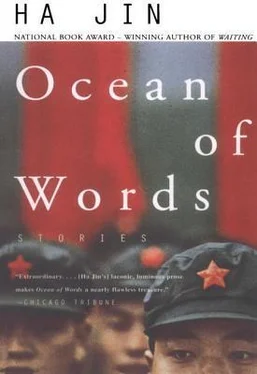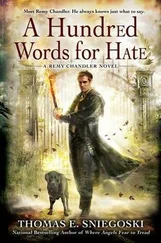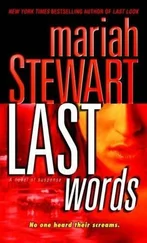Seeing the few men around him holding only carrying poles, we didn’t seriously intervene but merely shouted, “Don’t beat him. Don’t use force.” We thought a few strokes wouldn’t hurt him much and would give him enough of a warning not to escape again.
“Ouch!” Lev slumped down and started screaming. His body spun around on the gravel road and fell into the roadside ditch. There he lay on his back, and the green uniform on him turned mottled. His arms circled his head, wriggling to loosen the handcuffs, while his legs stretched motionless.
“Halt, halt!” We all ran over and pushed the wild people away. We had not expected they would beat him as if they wanted to kill him. A young man was still struggling along in the crowd, waving a carrying pole in the air and crying, “Let me go! I’ll get even with him, the Russian Tartar.” He was the one who had broken Lev’s right leg. We caught him, together with his pole, and brought him into the headquarters. Later we came to know that his elder brother, a platoon leader in the militia, had been shot by a carbine going off accidentally that morning.
Meanwhile Lev was moved into the Office of Mail and Information. He smelled like a goat, and his body was quivering on the cement floor. He was moaning in a choked voice and kept his eyes closed, as if he were a dumb animal that couldn’t speak a human word, although Interpreter Jiao was standing by. Some parts of his clothes were soaked with sweat. Squad Leader Shi held up Lev’s neck and raised a glass of cold water to his mouth. Lev drank it up without opening his eyes. It seemed he didn’t care whether we gave him water or poison.
Doctor Cai came with an ambulance. We carried Lev out and put him into the van. Immediately the siren started and the ambulance sped to the Twenty-third Field Hospital.
That night we packed up and returned from the airport to our billet in the Company Headquarters. It was the last time we saw Lev, whose identity was clarified after his escape, since he had no one to meet and even fled toward Beijing to get back to Russia.
We were told two months later that he was returned to his country in exchange for a defector from the Fourth Regiment. Though we knew who Lev Petrovich was now, I guess, it would not be easy for him to prove who he was to the Russians. They would suspect him of being either a traitor or a Chinese agent. Lucky for him, he had a broken leg.
After lunch I was lying on the bed and reading a novel, The Boundless Snow and Forest . Scribe Hsu Fang came in and said, “Instructor Chen, there’s a man outside from your hometown. He wants to see you.”
“Really, who is he? Are you sure he is my fellow townsman?” I got up and put the book on the bedside table.
“Yes, he said he wanted to see you.”
I went out to the drill ground. The sun was scorching. The barracks were quiet since the men of my company were taking a nap.
Hmm, Chu Tian, of course he was my townsman. Although he wore civvies, I recognized him at first sight. If he had shed his skin and flesh, I could have identified his bones. Strange to say, he was carrying on his back a sleeping child, from whose gaping mouth was dripping a thread of saliva. He smiled at me awkwardly, his bony face stretching sideways and his cupped ears sticking out of unkempt hair.
“Why do you want to see me?” I asked, wondering how he had fallen into such a state. How did he come to be like a beggar, wearing blue rags and reeking of ram urine? He reminded me of a pig in a muddy pen.
“Chen Jun, I–I wouldn’t trouble you, if I had a way out. My boy is sick, pneumonia, so we came to you for help.” His thick nose twitched.
“Why me? Aren’t you a doctor yourself?”
“I don’t know anybody here but you. Please forget the hard feelings between us for the moment. He’s dying. Save the child, please!”
What could I do? I led him into my room in the Company Headquarters and then sent for the medic, Ren Ming. The boy seemed very sick and hardly made any noise.
Ren told me we had plenty of penicillin. Being a doctor himself, Chu sterilized a syringe with a cotton ball and injected a large dose into his son’s rump. He lay the boy on my bed. “There, there, have a good sleep.” He covered him with a dirty jacket.
Damn, allowed into my room, he took my bed.
Chu turned to me. “The pneumonia was caused by measles. But as long as we have penicillin, I can cure him.” He sighed. “We’ve traveled for over a month, sometime sleeping in train stations at night and sometimes in the open air. I’m lucky that I haven’t fallen ill myself. He’s too young to stand this kind of life.”
I didn’t make any comment, but his last few sentences aroused my interest. Scribe Hsu Fang brought in a thermos bottle and three mugs. He placed them on my desk and went out.
“I have a lot of things to do this afternoon,” I said, ready to leave. “You can stay here with the boy.”
As I was walking out, Chu stood up. The rascal, at least he didn’t forget to be respectful here.
I don’t know why I didn’t tell him to go away, to get out of my face. I hated him. He had been engaged to my elder sister for three years and then jilted her because he had been promoted to officer’s rank in the army. Certainly girls in Beijing were more attractive, with whiter faces and softer bodies, certainly he was no longer the country boy he had been, but it was immoral for him to throw away his fiancée simply because his status had improved. My sister wept for days, saying she could not go out and face others. I remembered that I had wanted to go to Chu Village, which is six li from ours, and ask his parents to give a good reason for his breach, but my mother stopped me, saying there was no use. The Chus were too powerful for us to quarrel with.
I hated his guts! But what should I do now? In the presence of my men, I could not be rude to him, especially after the sentry, the medic, the orderly, and the scribe had all seen the sick boy. Though reluctant to treat him as a fellow townsman, I told the mess squad to prepare a guest dinner for two. In the soldiers’ eyes, it would be shameful to let your fellow townsman eat an ordinary meal. It seemed he wouldn’t leave in hours, and I had to pay out of my own pocket for the dinner. Of course I didn’t mind feeding him, but only with horse droppings.
How had he come to be living the life of a vagrant? What a dandy he had been six years before, when he returned home for the Spring Festival from Beijing, where he served as a doctor in the army’s Central Hospital. Both his wife, a pharmacist, and he wore shiny leather shoes and brand-new green overcoats. When they walked on the street, children would follow them, whistling and shouting, “Big officers. Turn back. Big officers.” At that time, I was merely a squad leader, and he didn’t bother to nod his head when we passed each other in our town. Now look at him — even the dogs in his home village would growl at such a tramp.
Company Commander Yee was away with the Third Platoon in the Southern Mountains helping the peasants with their harvest, so I didn’t invite anybody to dinner and sat alone with Chu in my room. The boy, still sleeping, was better, his temperature three degrees lower. Chu kept glancing at the pork ribs and the fried tofu on the table.
“Help yourself.” I filled my own bowl with rice. I didn’t share a cup of liquor with him. A good meal was more than enough.
He swallowed a large piece of tofu and took a mouthful of rice. “Oh, thank you, Brother Chen. I haven’t had such food for five weeks.”
Shut up! Who’s your brother?
“Brother Chen.” He started again, showing his big yellow teeth. “I’ll never forget this. Oh, so delicious!” His lips were oily.
Читать дальше











